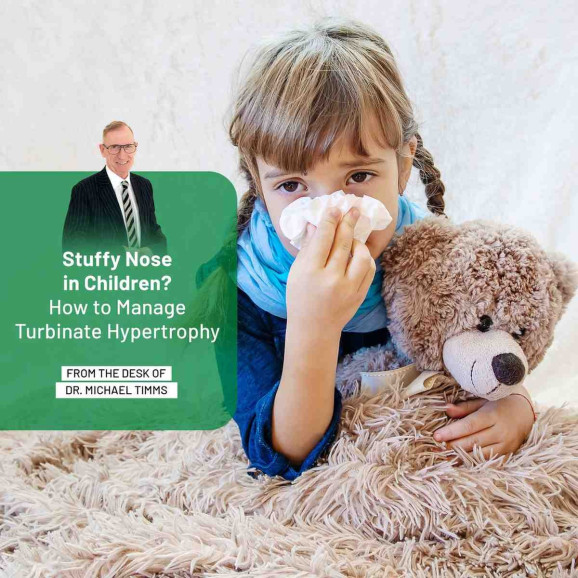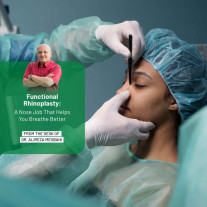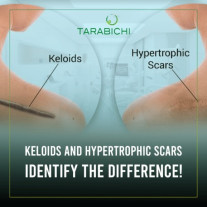Stuffy Nose in Children? How to Manage Turbinate Hypertrophy
Contact Us
Has your child been struggling with a constantly blocked or stuffy nose, snoring loudly at night, or experiencing frequent nosebleeds? Maybe they seem tired during the day, have difficulty concentrating, or complain about a reduced sense of smell. These could all be signs of inferior turbinate hypertrophy, a condition in which the small structures inside the nose known as turbinates become enlarged, obstructing airflow and making normal breathing more difficult.
Breathing is such a fundamental part of daily life, yet when a child struggles with nasal obstruction, it can impact their sleep, mood, and even overall development. At Tarabichi ENT, our team of the best ENT specialists in Dubai is dedicated to helping children breathe easier, sleep more soundly, and maintain their overall well-being. Our mission is to provide parents with a clear understanding of nasal conditions like inferior turbinate hypertrophy, while offering practical guidance for diagnosis, treatment, and management.
This comprehensive guide will walk you through everything you need to know about inferior turbinate hypertrophy in children: what it is, how it can be diagnosed, available treatment options, and practical steps parents can take to support their child’s health. With this knowledge, you can make informed decisions to improve your child’s comfort, sleep quality, and daily life.
What Is Inferior Turbinate Hypertrophy?
Has your child been struggling with a constantly blocked or stuffy nose, snoring loudly at night, or experiencing frequent nosebleeds? Maybe they seem tired during the day, have difficulty concentrating, or complain about a reduced sense of smell. These could all be signs of inferior turbinate hypertrophy, a condition in which the small structures inside the nose known as turbinates become enlarged, obstructing airflow and making normal breathing more difficult.
Breathing is such a fundamental part of daily life, yet when a child struggles with nasal obstruction, it can impact their sleep, mood, and even overall development. At Tarabichi ENT, our team of the best ENT specialists in Dubai is dedicated to helping children breathe easier, sleep more soundly, and maintain their overall well-being. Our mission is to provide parents with a clear understanding of nasal conditions like inferior turbinate hypertrophy, while offering practical guidance for diagnosis, treatment, and management.
This comprehensive guide will walk you through everything you need to know about inferior turbinate hypertrophy in children: what it is, how it can be diagnosed, available treatment options, and practical steps parents can take to support their child’s health. With this knowledge, you can make informed decisions to improve your child’s comfort, sleep quality, and daily life.
Causes of Turbinate Hypertrophy in Children
There are several reasons why turbinates may swell in children, including:
- Allergies: Exposure to pollen, dust, or pet dander can trigger inflammation.
- Colds and Respiratory Infections: Frequent infections can cause congestion and mucus buildup.
- Chronic Sinus Inflammation: Persistent sinus irritation can enlarge turbinates.
- Environmental Irritants: Smoke, dust, or pollution may lead to swelling.
- Medications: Overuse of nasal decongestants can worsen turbinate hypertrophy.
- Genetic or Developmental Factors: Some children may naturally have larger turbinates.
Understanding the underlying cause is crucial for effective treatment. Our best ENT doctors in Dubai can identify these causes and recommend the right solutions.
Symptoms and Diagnosis
Symptoms of Inferior Turbinate Hypertrophy
Parents should look out for:
- Persistent nasal congestion or blocked nose
- Mouth breathing, which can lead to dry mouth and dental issues
- Snoring and sleep disturbances, affecting rest and daily energy
- Recurrent sinus infections, due to impaired mucus drainage
- Frequent nosebleeds, caused by pressure on blood vessels in the turbinates
If your child exhibits these symptoms, consulting the best ENT clinic in Dubai, Tarabichi ENT, is the first step to a proper diagnosis.
Diagnosis Process
At Tarabichi ENT, our specialists use advanced diagnostic methods to examine the nasal passages. These include:
- Physical Examination: Checking for visible swelling or blockage
- c: A thin, flexible tube with a light and camera allows detailed visualization of the inside of the nose to determine the size and cause of turbinate hypertrophy
Accurate diagnosis is critical for choosing the most effective treatment plan for your child.
Treatment Options
The treatment for inferior turbinate hypertrophy depends on its severity and underlying cause. Options include:
1. Medications
- Nasal steroid sprays, antihistamines, and decongestants can reduce inflammation and relieve congestion
- Antibiotics may be used if infections are contributing to swelling
- Medications should be used under supervision, as long-term use may reduce effectiveness or cause side effects
2. Allergy Testing and Therapy
- Identifying and managing allergies can reduce turbinate inflammation
- Immunotherapy or allergen avoidance strategies may be recommended
3. Surgery (Turbinate Reduction)
- Recommended when medications and allergy therapy are not effective
- Surgery reduces turbinate size, improving nasal airflow
- Most procedures are minimally invasive, safe, and highly effective
The best approach should be determined by the best ENT surgeon in Dubai at Tarabichi ENT, ensuring each child receives a personalized, safe, and effective plan.
FAQs
Q: Can enlarged turbinates cause ear problems?
A: Yes. Swollen turbinates can create ear pressure, ringing, or even hearing loss. Our best ear doctors in Dubai can help assess and manage these symptoms.
Q: Do turbinates grow back after surgery?
A: While a small chance exists, studies report an 82% success rate. Most children experience lasting relief after turbinate reduction.
Q: Are swollen turbinates dangerous?
A: They are rarely dangerous but can cause discomfort and breathing issues if untreated. Early evaluation by the best ENT specialist in Dubai is recommended.
Helping Your Child Breathe and Sleep Better
Inferior turbinate hypertrophy is manageable with timely diagnosis and treatment. With Tarabichi ENT, children can enjoy:
- Clearer nasal passages
- Better sleep quality and reduced snoring
- Relief from sinus infections and nosebleeds
- Improved overall comfort and quality of life
Don’t let nasal obstruction affect your child’s daily life. Schedule a consultation with the best ENT clinic in Dubai, Tarabichi ENT, and get a personalized treatment plan that suits your child’s needs.
Our team of the Best ENT doctors in Dubai, at Tarabichi Healthcare is committed to delivering world-class care with precision and compassion.
Meet our dedicated specialists: Dr. Muaaz Tarabichi, Dr. Michael Timms, Dr. Mustafa Kapadia, Dr. Satish Jain, and Dr. Jamal Kassouma.
We provide minimally invasive treatments tailored to your condition, with a strong focus on safety, accuracy, and long-term results.
For Consultations and Appointments, reach out to us at




